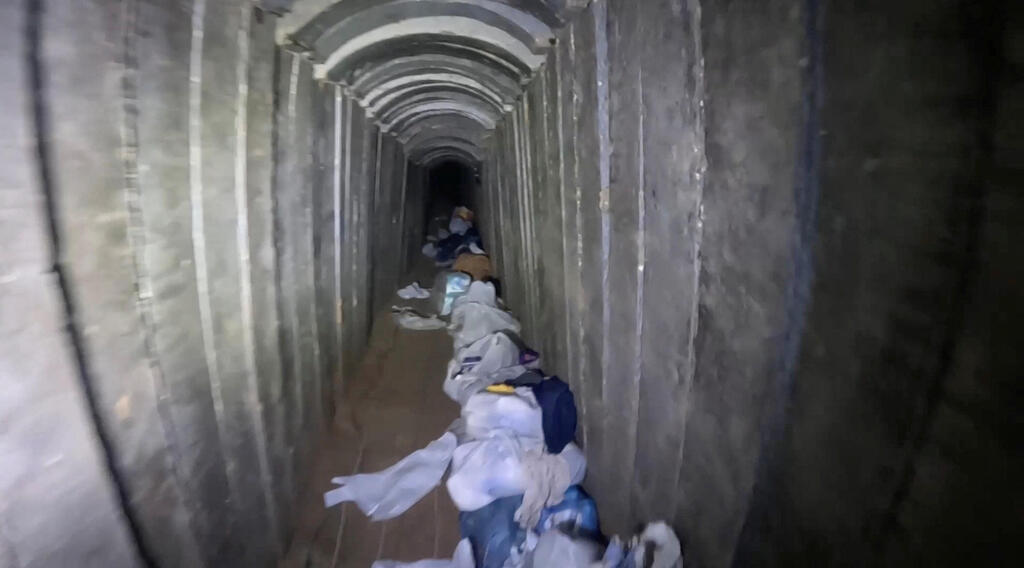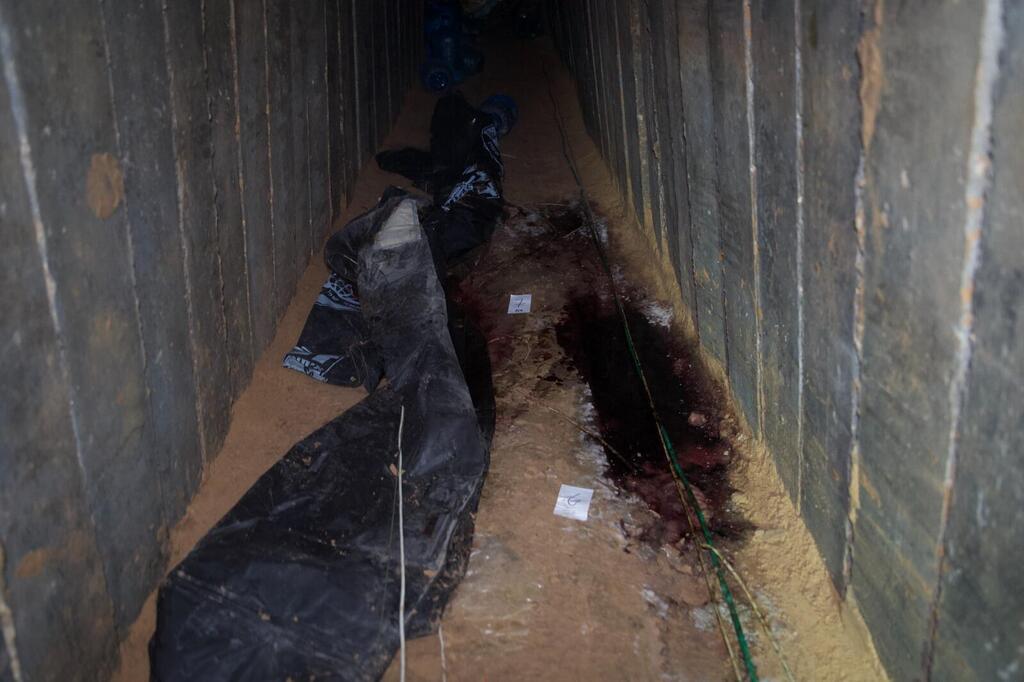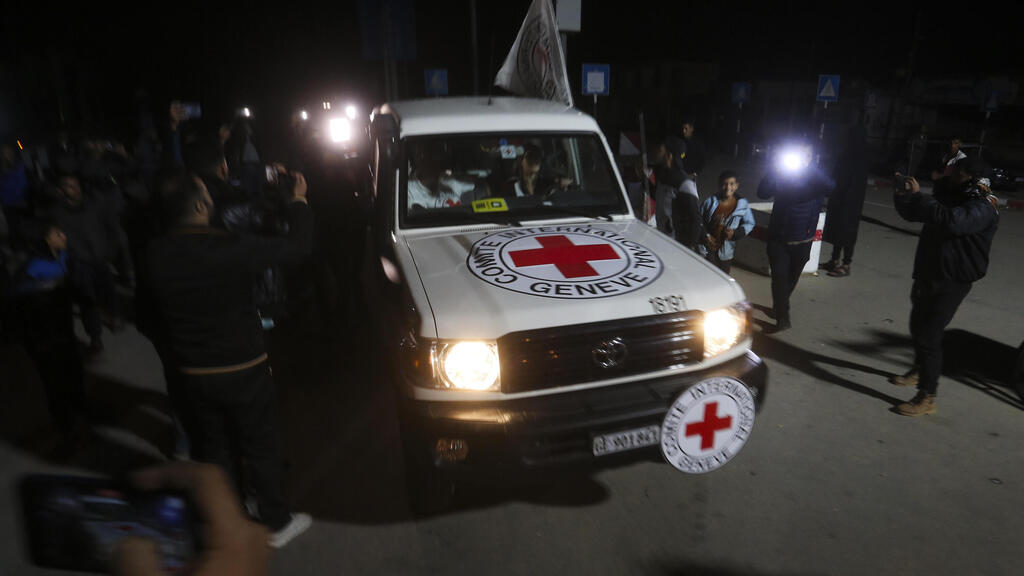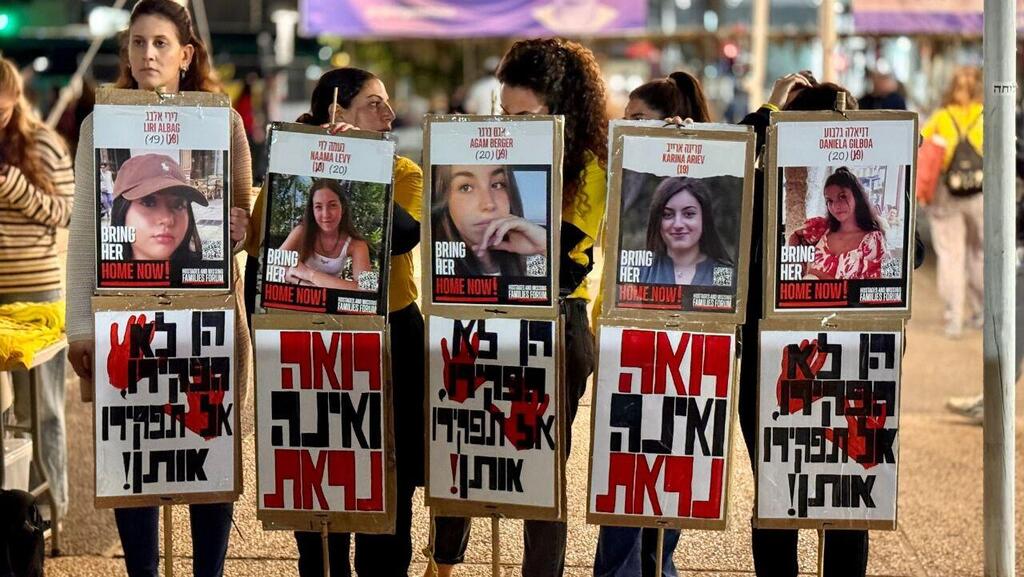Getting your Trinity Audio player ready...
"Teenagers were forced to commit sexual acts on each other, most women were sexually assaulted": This was described in the harrowing report spread over eight pages, that includes horrific testimony of hostages who were freed from Hamas captivity.
The report that was prepared by the Health Ministry was submitted to the UN last week. It describes neglect, abuse, torture and humiliation that the hostages endured.
The report begins with a description of the massacre of October 7, 2023, in the communities near the Gaza border. "The abduction of children, women, men, and the elderly from their homes is a traumatic event, often occurring after the murder of family members or close friends. In some cases, children were taken without their parents or after their parents' murder. The terrorists caused widespread destruction, with hostages witnessing their homes burning, acts of rape and looting which took place in their communities. The captives were transported to Gaza in open vehicles, often alongside the bodies of those murdered. They endured beatings, humiliation, and verbal, physical, and sexual violence during the journey.
Seven weeks after the atrocities, a deal to release hostages began. It spanned seven phases. The report notes that in the exchange, 105 hostages – 81 Israelis and 24 foreign nationals including 37 children (22 girls and 15 boys,) 16 elderly women and 52 adults including 27 women and 25 men, were released. In the ensuing months, one woman and four men were rescued alive and the bodies of 15 men and women were extracted from Gaza.
Beating, isolation, branding, sexual assault
Women, men, and children who returned from captivity reported that they endured severe physical and sexual abuse, such as beatings, isolation, deprivation of food and water, branding, hair-pulling, and sexual assault. Additionally, some of them reported that the captors sexually assaulted them or forced them to undress.
"Two of the children that were held together during captivity reported that they were held bound and were beaten throughout their captivity. Signs of binding, scars, and marks consistent with trauma were found. Additionally, two young children had burn marks on their lower limbs. One child stated that the burns were the result of a deliberate branding with a heated object.
"Both the child and adults who were with him in captivity described the incident as a purposeful branding event, not an accident. It was described as an extremely traumatic experience. Cases of Physical and Sexual Violence Against Women and Men One of the returned hostages described being sexually assaulted at gunpoint by a Hamas terrorist.
"On several occasions, captors forced women of all ages to undress while others, including the captors, watched. Some women reported that the captors sexually assaulted them. In addition, some women reported that they were tied to beds while their captors stared at them. Another woman, injured during the attack, was held in a dark isolation for 30 days, bound and unable to move. She had no contact with the outside world, received an inadequate amount of food and water, and did not receive treatment for her injury. Other women also reported starvation and abuse by their captors The men endured severe physical abuse, including continuous starvation, beatings, burns with galvanized iron (branding), hair-pulling, confinement in closed rooms with a limited amount of food and water, being held in isolation with hands and feet tied, and being denied access to the bathroom, which forced them to defecate on themselves."
The report describes how the hostages were deprived of medical treatment.
" The hostages were denied medical treatment for acute injuries caused during October 7 and subsequently, in addition to for untreated chronic conditions. Fractures, shrapnel wounds, and burns were treated inadequately, leading to complications which required additional surgeries, that could have been prevented with proper care. Upon arrival in Israel, intensive treatment was given to the returned hostages. The captors also tortured those injured by performing painful procedures without anesthesia. Many hostages also suffered from untreated chronic conditions (e.g., heart failure, diabetes, hypothyroidism), leading to severe short-term medical deterioration, such as low blood pressure, bradycardia, and hypothermia. In one case a hostage died from untreated medical complications. Also, several older women required urgent life-saving treatment due to untreated hypertension and hypothyroidism."
Starvation of hostages was deliberate, the report said.
"About half of the returned hostages described being deliberately starved during their captivity. They were given a poor diet, which often led to hunger that worsened over time. In addition to inadequate nutrition, they were kept in dark spaces, increasing the risk of vitamin D deficiency. This malnutrition resulted in an average weight loss of 815 kg (10-17% of body weight), with children losing an average of 10%, and in one extreme case, a girl lost 18% of her body weight. Poor nutrition may lead to Sarcopenia, delayed wound and fracture recovery, and a weakened immune system. Malnutrition also negatively impacted cognitive function and mental health, and as for children, it may hinder development and growth."
Hostage Matan Zangauker abducted to Gaza
Ahead of their release their captors attempted to improve some of the hostages' appearance and weight.
" Those who received excess food before returning to Israel were at risk of Refeeding Syndrome and electrolyte imbalances such as hypokalemia, hypomagnesemia, and hypophosphatemia, particularly among elderly hostages.
"In cases with complex medical backgrounds, these electrolyte disorders can be life-threatening. Additionally, the hostages were denied essential medications and treatment for their injuries, leading to the risk of widespread metabolic disorders. The poor quality of food and water, combined with unsanitary conditions, led to increased morbidity among the hostages. Many suffered from diarrhea, abdominal pain, and sometimes constipation. They had limited access to showers and returned with skin infections, including Dermatitis. Infections were detected in hospital cultures (Clostridium, Salmonella, Vibrio, Shigella, Giardia, E. coli). Some were diagnosed with Q fever, while two returned hostages suffered from acute case of Q fever. Several of the elderly women developed Deep Venous Thrombosis due to age, pre-existing medical conditions without medication, and lack of mobility during captivity."
Returning hostages suffered survivors guilt
The released hostages suffered survivor's guilt and trauma. Children refused to be parted from their mothers for even minutes.
"Some returned hostages had paranoid anxieties, fearing retaliation against their loved ones still in captivity if they spoke about their experiences. The inability to share their trauma with therapeutic factors, which made it harder to process their trauma. The returned hostages have been experiencing "survivor's guilt," feeling responsible for being rescued while their loved ones remain in Gaza. This guilt delays their return to routine and rehabilitation. Some wish to return to captivity to help those left behind, feeling they are "not rehabilitated" as long as their loved ones are still there. The concern for those remaining is unbearable for them and their families. Many returned hostages experience fear, restlessness, emotional detachment, and confusion. Some were afraid to leave their rooms, even in the hospital's protected areas. They struggled to let go of behaviors from captivity, like barely eating and neglecting hygiene.
"Others hoarded food, fearing they would not have enough for the next day, despite knowing this was irrational. The returned hostages also reported severe nightmares and sleep deprivation, trying to avoid repeating nightmares. Some experienced derealization, struggling to accept their presence in the Israeli hospital as real, rather than a dream from captivity. They avoided anything that reminded them of their traumatic experiences, including certain foods."
<< Get the Ynetnews app on your smartphone: Google Play: https://bit.ly/4eJ37pE | Apple App Store: https://bit.ly/3ZL7iNv >>
"The report we are submitting to the UN is a harrowing testimony to the brutal experiences suffered by the hostages in Hamas captivity—cruel violence, psychological abuse, physical torment, and acts that defy comprehension, Health Minister Uriel Busso said.
"These are actions that cannot be tolerated and demand that the world wake up and take action. The report highlights the horrors the hostages endured and reveals to the world the brutality of the enemy with whom Israel is engaged. The testimonies presented in this report serve as a wake-up call for the international community to apply increased pressure on Hamas and its supporters to free all the hostages without delay. I urge the global community to utilize all available means to end this cruelty and bring the hostages home immediately. It is a moral and humanitarian imperative, and the time to act is running out."
BEATEN, STARVED, BRANDED
(ILTV)









